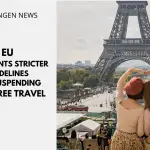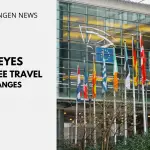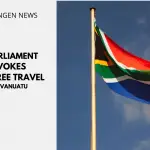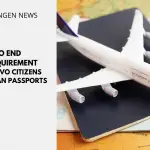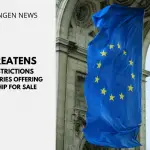EU Expands Grounds to Suspend Visa-Free Travel for Third Countries

The European Union (EU) is introducing tougher rules that will make it easier to suspend visa-free travel agreements with countries outside the EU. These changes are meant to help the EU respond more quickly to threats such as security concerns, human rights violations, or misuse of investor citizenship schemes—also known as “golden passports.”
Currently, citizens of 61 non-EU countries, including Ukraine, Georgia, Moldova, and several Western Balkan nations, can travel to the EU without a visa for up to 90 days within any 180-day period. But under the new rules, the EU will have more power to temporarily or permanently stop this visa-free access if certain issues arise.
Key Reasons the EU Can Now Suspend Visa-Free Access
Here are the key reasons the EU can suspend visa-free access:
- Security threats: A sharp rise in crimes or risks tied to a country’s citizens.
- Human rights violations: If a government is found to be seriously breaching international law or human rights.
- Golden passport schemes: If a country offers citizenship through investments to people with no real connection to that country, it could raise security concerns.
- Misuse of asylum: A large increase in asylum requests from a country that mostly gets rejected may lead to action. An asylum recognition rate will now be considered low if it falls below the new threshold of 20%.
- Diplomatic pressure using migrants: If a country is seen as using migrants to destabilise or pressure EU states.
- Not following EU visa rules: If a country’s own visa policy allows irregular migration into the EU, especially through bordering countries.
What Does This Mean for Travellers?
If your country is found to be violating any of the conditions, you could lose visa-free access to the EU. This means you’d have to apply for a visa before travelling—even for short stays.
The EU will use a step-by-step process: starting with a temporary suspension (now up to 12 months from 9 months, extendable to 24), while working with the country to fix the issues. The purpose of the suspension phase is to give the European Commission time to engage with the third country and work toward resolving the issues that triggered the suspension. If nothing changes, the visa-free status could be cancelled permanently.
For the first time, the EU is also targeting government officials. If they are linked to the violations, they could be blocked from using diplomatic or service passports to travel freely in the EU.
The EU wants to make sure that countries benefiting from visa-free access stick to shared values like human rights, the rule of law, and fair migration rules. Officials say the updated rules will help protect EU citizens and make the system fairer and more secure.
The changes are expected to be formally approved in the coming weeks and will come into force later in 2025.
What are your thoughts on this issue? Talk to us in the comment section below. Or if you need more advice on the above, contact us for further travel & immigration advice.
Check out the deals we have found below and tell us your travel plans.
Check out the offers and discounts from:
And because of the pandemic, don’t forget to get your travel insurance, which will cover you for flight disruptions and pandemic related matters.
IaM can help with your visa application to Europe, the United States, the UK & other countries
If you need help with a US visa, a UK Visa, or a visa to Europe, including help with appointment booking obligations, IaM can help. For more information and advice on US immigration, UK immigration law and US visa applications or if you need any help or assistance please, reach out to your Visa Coordinator at IaM.
Some of our posts include affiliate links. If you choose to purchase any of these products, we might get a small commission. For more information, check out our TOS.
- UK Issues Travel Warning Over Fire Safety in Croatia - 26 June 2025
- Belgium Tightens Borders: How It Could Affect Your Schengen Trip - 25 June 2025
- ETIAS Fee Under Review: Will Travelling to Europe Cost More? - 24 June 2025

